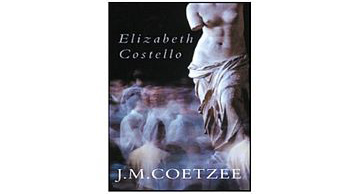Elizabeth Costello
by J.M. Coetzee
Viking, 230 pp, $21.95
reviewed by Adam Eaker
More philosophical meditation than novel, 2003 Nobel laureate J.M. Coetzee’s newest book, Elizabeth Costello, is a tantalizing but ultimately frustrating piece of fiction. The noted South African novelist, whose other books include Waiting for the Barbarians and Disgrace, seems to have found an alter ego in his supremely unsympathetic protagonist, an elderly, misanthropic, and much-celebrated Australian writer whose “books are, she believes, better put together than she is.”
No longer married and estranged from her two children, Elizabeth Costello is now engaged in traveling the world as a guest lecturer, and the novel is structured around eight talks she and other scholars deliver at various universities, conferences, and even a cruise ship bound for Antarctica. The novel’s academic settings give Coetzee the opportunity for some rather cheap shots at feminist and post-colonial criticism, but the novel’s initially intriguing structure soon leaves both Costello and the book mired in pedantry. In her lectures, Costello opines endlessly on such varied topics as Kafka, vegetarianism, the fate of Hellenism, and the meaning of religious art, at every occasion managing to offend at least one person in her audience. While these talks, and the ardent discussions that follow them, occasionally contain moments of deep insight into various issues of philosophy and morality, they are hardly enough to sustain a novel.
The entire book has something self-indulgent about it, as though perhaps Coetzee had simply packaged a few of his pet intellectual quandaries within the novel’s undeveloped frame. At one point, Costello acknowledges that “writing itself…has the potential to be dangerous” but that sense of danger is curiously missing from the novel which bears her name, in which even the most burning issues are abstracted and dissected in page after page of stiff, ponderous dialogue, bearing no resemblance to actual human speech. By the time of the novel’s labored conclusion, when Costello finds herself trapped in a sort of Kafkaesque purgatory, the reader has lost all patience with this unpleasant woman and her compulsive lecturing.
It’s a pity, because one senses Elizabeth Costello could have been a very powerful character study. Moments of great emotional power, as when Costello visits her sister at a convent or remembers an affair with a man whom she has since come to despise, make one wish Coetzee had written a far different novel. But Costello’s life remains, as she herself observes, a “story skulking, inconspicuous as a mouse in a corner,” suffocated by the dreary weight of her own intellect.

